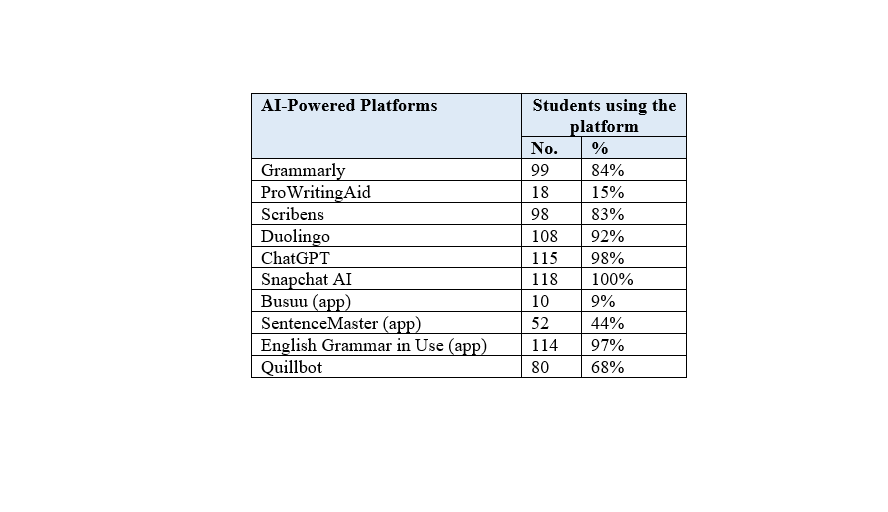Kurdish EFL Students' Perceptions towards AI-Powered Platforms for Learning English Grammar
DOI:
https://doi.org/10.21271/zjhs.28.3.19Keywords:
AI-powered platforms; Artificial Intelligence; EFL Students; Grammar; Perception.Abstract
The accelerated advancements of AI have extended to all the areas of learning English as a foreign language, including grammar learning. This study aims at investigating Kurdish EFL students’ perceptions and perceived feelings towards the use of AI-powered platforms for learning and improving English grammar. It additionally aims to explore whether the students can master English grammar solely through the use of AI-powered platforms, in absence of the traditional learning methods of grammar. This study employs a quantitative research approach administering a survey questionnaire to 118 Kurdish EFL students at Salahaddin University. The findings point out that the Kurdish EFL students perceive AI-powered platforms as good means for improving English grammar proficiency and they hold a favorable feeling towards the platforms. The findings further showcase that the students believe that they cannot master English grammar by relying solely on the AI-powered platforms. They rather find AI-powered platforms more effective when they are integrated into the traditional learning methods of grammar.
References
- Alammar , A. & Amin , E. A.-R., 2023. EFL Students' Perception of Using AI Paraphrasing Tools in English Language Research Projects. Arab World English Journal (AWEJ), 14(3), pp. 166-181.
- Aljohani, R. . A., 2021. Teachers and Students’ Perceptions on the Impact of Artificial Intelligence on English Language Learning in Saudi Arabia. Journal of Applied Linguistics and Language Research , 8(1), pp. 36-47.
- Badora, S., Ibnez, . L. & Aguero, M., 2013. Expert Systems: Fundamentals, Methodologies and Applications. J. Sci. Technol,, Volume 13, pp. 349- 363 .
- Chan, C. K. Y. & Tsi, . L. H., 2023. The AI Revolution in Education: Will AI Replace or Assist Teachers in Higher Education?, New York: Cornell University.
- Chen, H. & Pan, J., 2022. Computer or human: a comparative study of automated evaluation scoring and instructors’ feedback on Chinese college students’ English writing. Asian. J. Second. Foreign. Lang. Educ. , 7(34).
- Darwin, et al., 2024. Critical thinking in the AI era: An exploration of EFL students’ perceptions, benefits, and limitations. Cogent Education, Volume 11, pp. 1-18.
- Dornyei, Z., 2007. Research Methods in Applied Linguistics. Oxford: Oxford University Press.
- Ghaemi, H. & Bayati, M., 2021. Software technology and writing skills improvement of intermediate EFL learners. Journal of Research in Techno-based Language Education, 1(2), p. Article 2.
- Ghufron, M. & Rosyida, F., 2018. The role of Grammarly in assessing English as a foreign language (EFL) writing. Lingua Cultura, 12(4), p. 395.
- Kim, N. J. & Kim, M. K., 2022. Teacher’s Perceptions of Using an Artificial Intelligence-Based Educational Tool for Scientific Writing. frontiers in Education, 7(Article755914), pp. 1-13.
- Lee, Y.-J., Davis, R. O. & Lee, S. O., 2024. University students’ perceptions of artificial intelligence-based tools for English writing courses. Online Journal of Communication and Media Technologies, 14(1), pp. 1-11.
- Le, P. N., 2023. Students' Perceptions of the AI Technology Application in English Writing Classes. Proceedings of the AsiaCALL International Conference, Volume 4, pp. 45-62.
- Lytvyn, M., 2022. Grammarly History: How Has It Evolved?. [Online] Available at: https://becomeawritertoday.com/grammarly-history/[Accessed 5 January 2024 ].
- Mohamed, S. A. & Alian, E. I., 2023. Students’ Attitudes toward Using Chatbot in EFL Learning. Arab World English Journal (AWEJ), 14(3), pp. 15-27.
- Nghi, T. T., Phuc, T. H. & Thang , N. T., 2019. Applying Ai Chatbot For Teaching A Foreign Language: An Empirical Research. INTERNATIONAL JOURNAL OF SCIENTIFIC & TECHNOLOGY RESEARCH, 8(12), pp. 897-902.
- Omar, H. et al., 2024. ChatGPT: A New AI Tool for English Language Teaching and Learning among Jordanian Students. Kurdish Studies, 12(1), pp. 3628-3637 .
- O'Neill, R. & Russell. , M., 2019. Grammarly: Help or hindrance? Academic Learning Advisors’ perceptions of an online grammar checker. Journal of Academic Language and Learning, 13(1), pp. A88-A107.
- Persson, V. & Nouri, J., 2018. A systematic review of second language learning with mobile technologies. International Journal of Emerging Technologies in Learning, , 13(2), p. 188–210.
- Rich, E. & Knight, k., 1991. Artificial Intelligence. 2nd ed. Chicago: Chicago University .
- Schmidt-Fajlik, R., 2023. ChatGPT as a Grammar Checker for Japanese English Language Learners: A Comparison with Grammarly and ProWritingAid. AsiaCALL Online Journal , 14(1), pp. 105-119.
- Stockwell, G., 2016. Mobile language learning. In: F. Farr & L. Murray, eds. The Routledge handbook of language learning and technology. Routledge: s.n., p. 296–307.
- Sumakul, D. T., Abdul Hamied, F. & Sukyadi, D., 2022. Artificial Intelligence in EFL Classrooms: Friend or Foe?. LEARN Journal: Language Education and Acquisition Research Network , 15(1), pp. 132-256.
- Tran, T. M. L. & Nguyen, T. T. H., 2021. The Impacts of Technology-based Communication on EFL Students’ Writing. AsiaCALL Online Journal, 12(5), pp. 54-76.
- Jin, Y. H., 2018. Efficiency of online grammar checker in English writing performance and students’ perceptions. Korean Journal of English Language and Linguistics, 18(3), pp. 328-348.
- Zhao, Y. & Liu, G., 2019. How Do Teachers Face Educational Changes in Artificial Intelligence Era. Advances in Social Science, Education and Humanities Research (ASSEHR), Volume 300, pp. 47-50.

Downloads
Published
How to Cite
Issue
Section
License
Copyright (c) 2024 Nawsha Ghaleb Shareef

This work is licensed under a Creative Commons Attribution 4.0 International License.
Except where otherwise noted, content on this site is licenced
under a Creative Commons Attribution License 4.0 (CC BY- 4.0)









